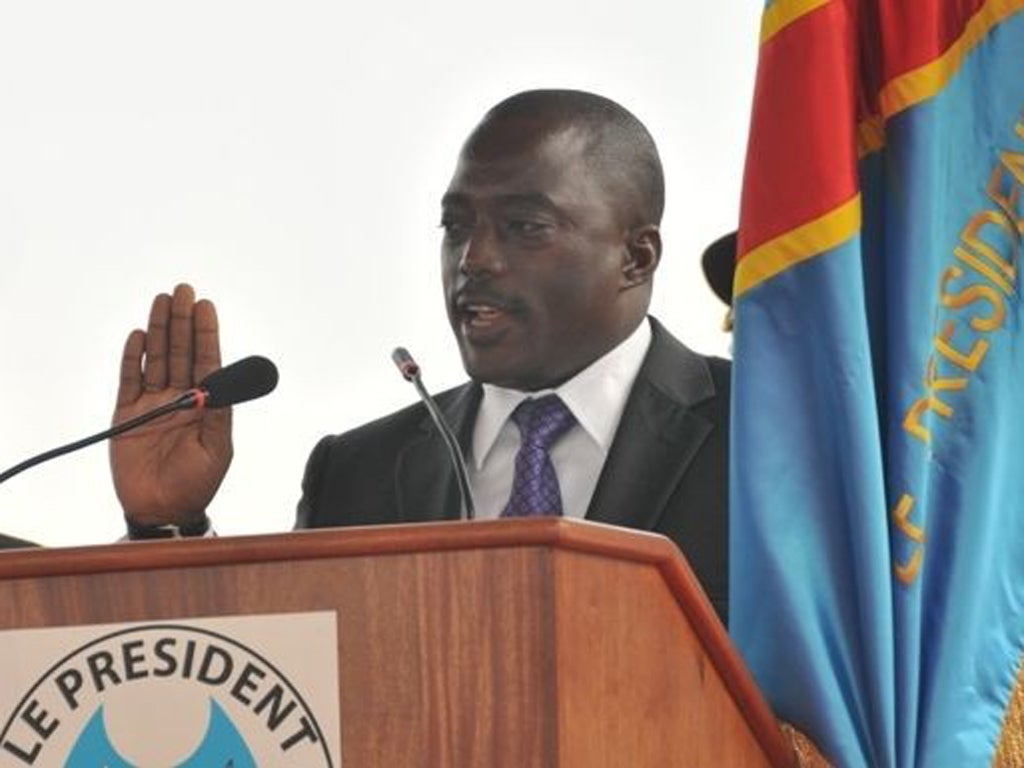Your support helps us to tell the story
From reproductive rights to climate change to Big Tech, The Independent is on the ground when the story is developing. Whether it's investigating the financials of Elon Musk's pro-Trump PAC or producing our latest documentary, 'The A Word', which shines a light on the American women fighting for reproductive rights, we know how important it is to parse out the facts from the messaging.
At such a critical moment in US history, we need reporters on the ground. Your donation allows us to keep sending journalists to speak to both sides of the story.
The Independent is trusted by Americans across the entire political spectrum. And unlike many other quality news outlets, we choose not to lock Americans out of our reporting and analysis with paywalls. We believe quality journalism should be available to everyone, paid for by those who can afford it.
Your support makes all the difference.The president of sub-Saharan Africa's largest nation was sworn in for another term, pledging to unify the country after an election that was criticised by international observers.
The country's top opposition candidate, meanwhile, planned his own inauguration in a move that could spark political chaos.
Congo's supreme court last week upheld the victory of President Joseph Kabila, who has been in power for more than a decade. However, second-place finisher Etienne Tshisekedi insisted on Sunday he was the country's democratically-elected leader and would take his own oath of office later in the week.
The army deployed tanks in the streets of the capital Kinshasa, before the ceremony amid fears of unrest if Mr Tshisekedi ordered his supporters to protest.
Mr Kabila delivered a message of national unity, describing himself as the president of all Congolese and vowing to create more jobs in his next five-year term. While Congo is mineral-rich, it has suffered through decades of dictatorship and civil war.
"I want to reassure here all those whom I did not persuade to vote for me. I invite them to believe in my determination to truly be the guarantor of the Congolese nation in all its diversity," he said.
Voting officials extended the November election by several days after voting materials arrived late in this vast nation with few paved roads. International observers also said voter turnout and Kabila's margin of victory were impossibly high in some districts.
US State Department spokeswoman Victoria Nuland has said that the elections were "seriously flawed, lacked transparency and did not measure up to the democratic gains" seen in recent African elections.
Organisations including the International Crisis Group, Enough and the Open Society Foundations had urged the government to delay the inauguration, citing a vote that was "marred by widespread irregularities".
Presidential election results showed Mr Kabila with 49% and Mr Tshisekedi with 32% of the nearly 19 million votes cast. Previously Mr Kabila would have needed 50% to have avoided a run-off, but he pushed electoral reforms through parliament that included only one round of voting instead of two.
The November election was only the second democratic vote in Congo's 51-year history, and the first to be organised by the Congolese government rather than by the international community. The country's east is still wracked by violence from a myriad of militias and rebel groups.
Mr Kabila became president after his father's 2001 assassination and later won a landmark 2006 vote that was largely run by the United Nations, which still has some 19,000 peacekeepers there, nearly a decade after civil war ended.
AP

Join our commenting forum
Join thought-provoking conversations, follow other Independent readers and see their replies
Comments